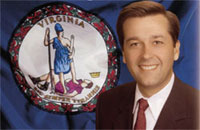The Republican Party of Virginia just doesn’t know when to throw in the towel.
They got nabbed for two eavesdropping scandals in March of 2002, in which they illegally monitored calls made by top Democrats, including Governor Mark Warner. The RPV executive director, Edmund A. Matricardi III, pled guilty to a federal count of intercepting a wire communication back in 2003. Matricardi went down fighting, fingering Republican leaders, including party chair Gary Thompson, House Speaker Vance Wilkins, Wilkins’ chief of staff Claudia Tucker, and, lo, the office of Attorney General Jerry Kilgore. After the RPV settled the civil suit last December, they had to cough up $750k to Democrats and another $200,000 to their attorneys. And now — get this — they’re suing their insurance company. Why? Because their insurance company won’t cover the costs.
They claim — and I love this — that they (“they” being RPV, Inc.) didn’t eavesdrop, but, rather, rogue operatives did. Rogues like the party chair, the party executive director, the House Speaker, and the office of their top elected official in the state. Presumably, “they” would be the corporation, a legal person, which is not, of course, capable of eavesdropping, because their corporation does not have ears or fingers or the ability to interface with a telephone, what with being a legal fiction.
 What’s totally, totally nuts about this is that Kilgore is running for office right now Kilgore is heavily implicated in this scandal, though has never been caught. The last thing that his campaign wants is this eavesdropping scandal being brought to the public’s attention right now.
What’s totally, totally nuts about this is that Kilgore is running for office right now Kilgore is heavily implicated in this scandal, though has never been caught. The last thing that his campaign wants is this eavesdropping scandal being brought to the public’s attention right now.
When this was brought up in late 2003, Kilgore uttered those famous lines (“I have no duty to you Mister Lieutenant Governor”), offering the weak-kneed defense that nobody “in that room” met with RPV executive director Ed Matricardi, blaming newspapers for writing terrible things about him that just aren’t true.
And the story came up yet again a year ago tomorrow, when it was discovered that Jerry Kilgore’s campaign manager, Ken Hutcheson, knew about the eavesdropping, but didn’t know it was illegal to eavesdrop on private telephone conversations with the governor. And it came out that Kilgore’s chief of staff, Anne Petera, listened to a tape recording made of the conversation. Yet, still, Kilgore just didn’t know anything about it.
That’s right: the attorney general didn’t even know about the crimes going on in his own office. That’s a hell of an excuse.
Jerry Kilgore has repeatedly tried to cast himself as the big hero here. He valiantly, eventually, caught onto the eavesdropping, and shut the whole operation down. Or so goes the story.
The Charlottesville Daily Progress‘ Bob Gibson is equally suspicious, and he brought the whole sordid affair back into the public eye last December, writing:
Last year, I asked Attorney General Jerry W. Kilgore what he would do if he found that one of his employees had been untruthful.
Kilgore said he did not believe he had any such employees.
I asked him what he would do if he found that his chief of administration, Anne P. Petera, had been untruthful.
Kilgore said he had no such knowledge about her but would not tolerate untruthful staff behavior if he found it.
Thinking those were good and truthful answers, I wondered how hard he would look.
As it turns out, he’s looked about as hard as O.J. Simpson has for “the real killer,” or, more aptly, as President Bush has to track down the White House employee who leaked Valerie Plame’s identity. Gibson just isn’t buying the story that Kilgore’s chief of staff, Anne Petera, tried desperately to stop Matricardi from continuing eavesdropping:
If Petera, still Kilgore’s chief of administration, really did warn and object so strongly, why would Matricardi have handed her his notes, which were evidence, and why would he have eavesdropped again two days after that?
Some top GOP leaders know that makes no sense.
If Kilgore wanted to ask his staffers if they’d broken the law, he could have. If he wanted to investigate them — as one would imagine the attorney general should do — he could have. But he didn’t. Was that because he was a) incompetent b) lazy or c) involved?
I don’t honestly know the answer to that question. Perhaps a more interesting question is why the RPV would bring up this question in the middle of the race.
My favorite part about this is that money that Republicans raised from Republican donors had to go to Democratic candidates. Hilarious.